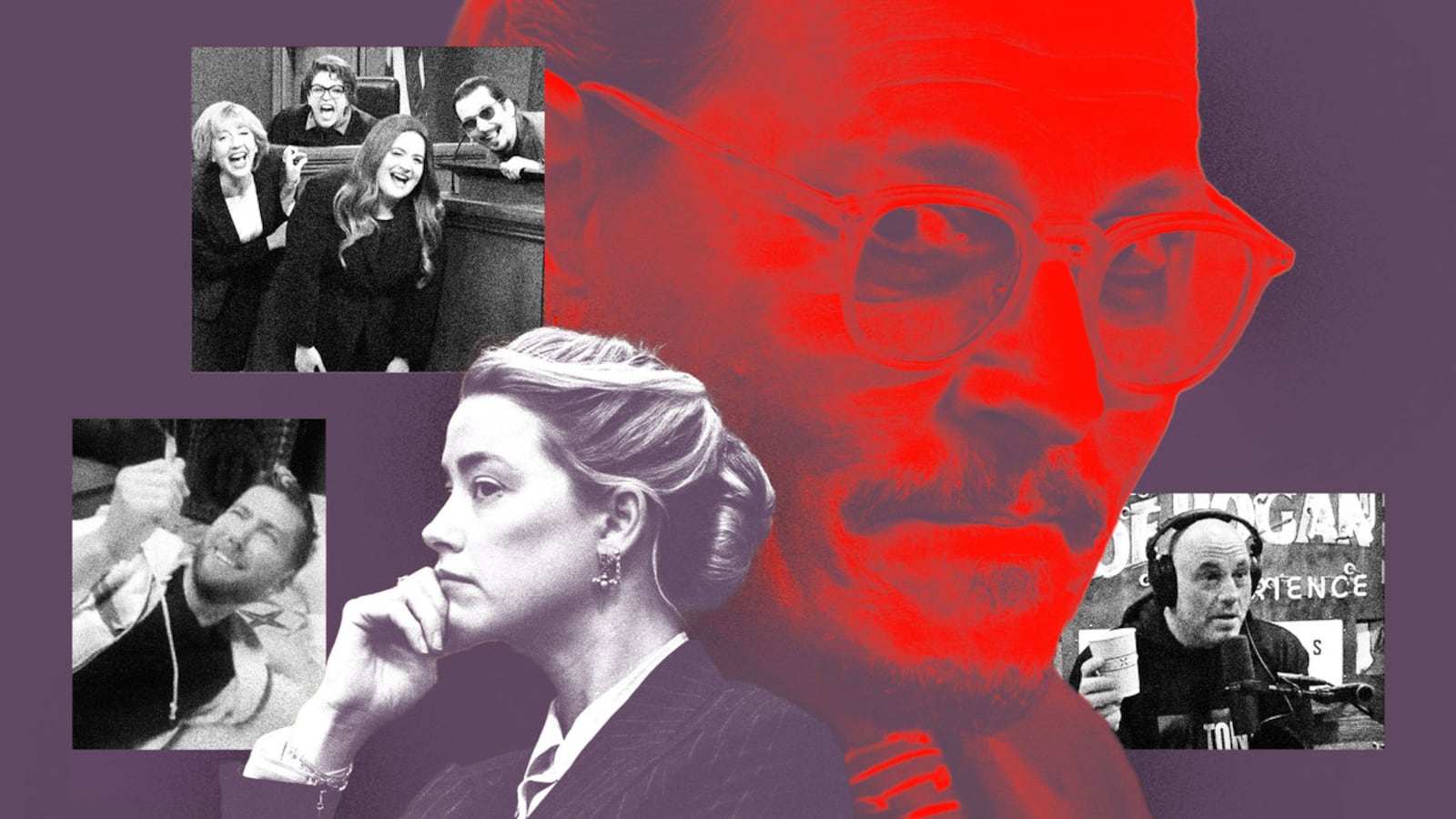On Monday, a tearful Amber Heard concluded her testimony with a mournful refrain about her ex-husband, Johnny Depp. “I just wanted him to leave me alone,” she said. “I just want to move on with my life, and he won’t let me.”
Depp has denied abusing Heard—even alleging she was the abusive one in the relationship—and is suing her for libel in Fairfax County, Virginia, over a 2018 Washington Post op-ed in which she did not mention her ex by name but called herself “a public figure representing domestic abuse.” Depp’s lawyer has acknowledged that the state’s lax anti-SLAPP laws—which seek to limit lawsuits filed to silence public criticism—are part of the reason they’re bringing the case in Virginia, where neither Depp nor Heard resides. Advocates worry the public trial could serve as a playbook for abusers hoping to silence their accusers in the future, The 19th reports. The High Court in London already ruled on a separate defamation case Depp brought against The Sun and decided that an article calling Depp a “wife beater” and alleging that he abused Heard was “substantially true.”
But Virginia courts also happen to allow streaming of their proceedings with prior authorization from a judge—a convenient detail for anyone, say, looking to humiliate a domestic violence accuser on a massive scale with the help of a blindingly cruel, meme-addicted public. If Britney Spears lived in fear of Perez Hilton back in the aughts, one has to imagine TikTok and its many, many fan-edited courtroom videos occupy a similarly dreadful place in Heard’s psyche.
Much has already been made of the memes surrounding the trial from both Depp stans and clout-chasers. But even Saturday Night Live couldn’t resist the siren call of a tasteless gag. The show’s most recent installment opened on a courtroom re-enactment centered around (what else?) the allegation that Heard defecated in the couple’s bed toward the end of their marriage. (Heard denied the alleged defecation incident on the stand Monday. “I was not in a pranking mood,” she said. “My world was falling apart.”)
As one might have guessed, the cold open sparked widespread backlash from viewers who deemed it tasteless. Even worse, however, the sketch was unoriginal; it felt derivative of the countless re-enactments and “comedic” retellings that have bombarded anyone with a social media account like a plague for weeks on end. SNL might’ve helped shape meme culture as we know it today, but now it seems the show is merely a reflection of its worst impulses.
Alison Dagnes, a political science professor at Shippensburg University who has written extensively about the intersection of media and politics, notes that any joke made on SNL or the internet “can only be accepted if it’s conventional wisdom to begin with.”
“When I saw the opening skit for SNL last weekend, I thought, ‘Oh, dear,’” Dagnes told the Daily Beast during a recent interview. “If this is the way SNL is depicting it, whether they are following the curve or setting the curve, this is gonna be the curve and we’re done here.’”
Saturday Night Live, arguably a progenitor of meme culture, now appears to be chasing trends more often than it creates them. But the stakes remain the same for those unfortunate enough to become the butt of the joke. Women who break certain rules still face brutal punishment in the form of relentless humiliation from conservatives and reactionaries.
Monica Lewinsky recently got her cultural re-evaluation with American Crime Story: Impeachment, and Dagnes sees one parallel from that case here. When the President of the United States had an affair with a White House intern, the resulting ruckus—“the Lewinsky Scandal”—just happened to bear her name and not his. “They were making fun of him at her expense,” Dagnes said. Now, she believes, “they’re making fun of Johnny Depp at Amber Heard’s expense.”

Amber Heard testifies about the first time her ex-husband, actor Johnny Depp hit her at Fairfax County Circuit Court during a defamation case against her by Depp in Fairfax, Virginia, on May 4, 2022.
Elizabeth Frantz/AFP/GettyThere are plenty more examples where that came from. Comedians ignored Anna Nicole Smith’s obvious personal and health issues in favor of ridicule for years after her ill-fated marriage to 89-year-old tycoon J. Howard Marshall. Zoe Quinn’s ex-boyfriend started Gamergate with a 10,000-word manifesto that, among other things, baselessly claimed that she’d slept with a reviewer in exchange for a positive review in a male-dominated industry. The ridicule that followed Britney Spears so relentlessly resulted at least in part, I’d argue, from the Louisiana native’s refusal to conform to the class expectations that accompanied her newfound wealth.
But Dagnes sees a particular connection between examples like Heard, Lewinsky, and Smith—women unfairly seen as “reaching beyond their station to seduce men of power and then… complaining about it.”
“It’s the underlying, ‘What did you think would happen?’” she said.
Celebrities including Joe Rogan and Bill Burr have voiced their support for Depp and, in some cases, denigrated Heard. Plenty more have posted memes mocking Heard’s testimony. “This is a big win for Johnny Depp,” Rogan said during a recent episode of his podcast. “And a big loss for Pirates of the Caribbean!…You got rid of the best fuckin’ pirate you ever had! For a crazy lady!” Even Duolingo thought it was appropriate to join the fray with a coy TikTok comment.
Patrice Oppliger, an assistant professor in communication at Boston University who has written multiple books about mass media and gender, suggested there could be a little superiority theory at play here. The aptly named concept suggests that humans derive humor from ridiculing others. “We just like to punch down,” Oppliger said. “As much as we say people shouldn’t punch down with their humor, I think we enjoy it from a superiority standpoint, like, ‘Oh I would never admit to defecating in somebody’s bed.’”
Female comedians and writers, Oppliger noted, are in an especially tough spot: “If you don’t laugh, then, ‘Oh, well, you’re some uptight feminist that doesn’t have a sense of humor.’ But then you laugh and then you’re contributing to the disparagement.”
There’s a reason late-night shows and Saturday Night Live in particular got a boost during the Trump era: these programs all frame themselves as comedic companions to help Americans process the news of the week. But these shows have also historically been a boys’ club, a reality that’s fundamentally shaped their comedic lens.
Early SNL was a notoriously fratty environment in which male comics reportedly insisted women couldn’t be funny and talked over female colleagues to get their ideas across. (For more on that, check out Doug Hill and Jeff Weingrad’s Saturday Night: A Backstage History of Saturday Night Live, which dedicates a chapter to “The Girls” and their struggle to make room for themselves on the show.) Former writer and disgraced ex-senator Al Franken reportedly once felt comfortable pitching an SNL sketch about 60 Minutes’ Andy Rooney drugging and raping Leslie Stahl. And even today, the venerated sketch show’s network, NBC, faces a lawsuit from a former fan who alleges Horatio Sanz groomed her in front of his colleagues before sexually assaulting her. (Sanz has denied the allegations; a representative for NBC told The Daily Beast the company does not comment on pending litigation.) SNL has repeatedly landed in hot water for sketches that seem to make light of abuse and misconduct, from that notorious Alec Baldwin-Adam Sandler “Canteen Boy” sketch to 2017’s “Sexual Harassment Charlie,” featuring none other than accused sexual predator James Franco.
The jokes on late night and SNL also must appeal to a massive audience in a minuscule amount of time, so there’s little room for nuance—a disastrous condition in which to write about something as complex as domestic abuse. “We have such fast attention spans,” Dagnes said. “We are labeling people as heroes and villains, as demons and victims. And because of that, there’s just black and white.”
The internet is even worse—like an anonymous petri dish in which everyone’s worst impulses fester in disguise as “irony.” Platforms like TikTok have become a cesspool of viral videos that purport to prove Heard is lying and Depp is innocent. Depp’s attorney is now basically a fanfiction hero. Even former NSYNC singer Lance Bass somehow thought it would be funny to re-enact Heard’s testimony about the first time Depp allegedly struck her as part of a revolting viral trend. (Remember the time West Side Story actress Rachel Zegler got in hot water for her “dramatic reading” of Britney Spears’ furious Instagram post about her younger sister, Jamie Lynn? The celebrities never learn!)
In his video, Bass acts out a portion of testimony in which Heard stumbles over her words, fluctuating between saying she was on the carpet or the couch. As he switches positions, Bass gives a knowing nod, as though he is patronizing an unreliable narrator.
But there are no professional writers to blame for the ugliness unfolding on social media. The callousness Amber Heard has met is not anomalous but devastatingly common in our broader discourse, as abuse survivors know better than perhaps anyone. It’s inescapable and insistent, like toxic fumes that leave us choking on the air we breathe. It’s the product of an individualistic, patriarchal society that refuses to recognize domestic abuse as a collective problem and instead treats it as the purview only of those who endure it and those who prosecute it.








